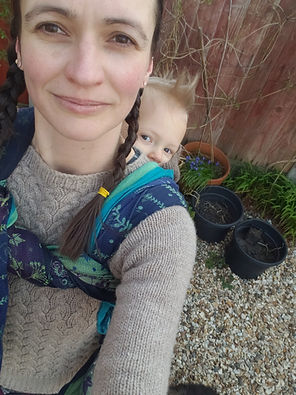
My Mothering Journey
I became a mother at the age of 25.
Straight out of the Uni, I had left my parental home to travel a bit and make some cash. After spending a few weeks in North England I came to London to visit the man I had met and fallen in love with at a summer festival. And we pretty much stayed together since.
Five months into us living together I was pregnant. What takes some couples years, we covered in months…
I came across the Juno magazine in the health shop where I worked – it was a true godsend to me. I was totally inexperienced, yet I knew I wanted a homebirth, to breastfeed and carry my baby in a sling, co-sleep.
How hard can it be?

When it came to it, I was often alone at home with my baby. I barely knew any people and nobody with babies. I struggled cooking, cleaning or finding a moment to myself. While I didn’t want to let my baby ‘cry himself to sleep’, sometimes I didn’t have a choice. I had no help or support as a mother, other than my partner.
Growing up in a family where babies didn’t get much closeness or attention, I wanted to raise my child differently. Yet I found our constant closeness too much sometimes.
Nevertheless, somehow we muddled along and my boy was growing up into a sweet, funny little person. When his brother came along, I had a slightly better idea how to care for a baby. Yet, I didn’t still have a plan for myself as a mother.
As much as I loved my boys, the older they got the more I struggled. I longed for some quiet me-time when I didn’t have to be a full-time mama – cooking, cleaning, running after my boys... There was nobody (no extended family) to take my children for a couple of hours here and there, except for school days or the weekends when my husband was at home. I was also going through a rough patch health-wise – it was draining to be constantly surrounded by activity and noise. Deep down I needed and wanted something more, yet didn’t know what and how to get it.
This was my motherhood journey for a good few years. As my boys grew, motherhood became even more challenging. It seemed like they knew exactly which of my buttons to press...
However, while going through these challenges, I slowly found my own calling – nutrition, psychosomatic medicine, writing. The more time I spent doing my own thing, the more perspective I started gaining. I came across some amazing podcasts and books. I realised that for all those years I had been suppressing my emotions, creativity, even my femininity. This process of self-discovery and self-awareness took some years (and is not fully over yet).
When I gave birth to my third boy at the age of 39, I had a much better idea of who I was and what I needed.
What changed? I have changed.
At the age of 25 I needed to travel, experience the world, mature – do things for my own inner growth. Because I became a mother after barely leaving education, I felt like I hadn’t lived much. I had no friends with children and no support as a mother, either.
Most of us are so unprepared – we often completely overlook our own needs as mothers. Our baby requires a LOT from us – on all levels. Yet, the mother needs mothering, too. When we don’t know how to replenish ourselves, we struggle. We may encounter health challenges, impatience, inability to support and nourish our children...
It is very obvious to me now – I have to fill my own cup first before I can pour from it into somebody else’s. I used to run on empty all the time and could not be the mama I wanted to be. I didn’t want to lose temper with my boys or to feel relieved when they went to school or finally fell asleep. However, I did.
Once I started my personal reclamation journey, gradual healing happened on so many levels. I realised that those buttons my boys kept pressing, were very little to do with them or me being a ‘bad mother’. It was simply old stuff (from childhood mostly) I needed to re-visit, properly look at and then let go of.
Finding other like-minded mamas was another very essential step.
As a result, I have reached a place of deep stillness and trust within me that nourishes my mind and soul. No matter what is happening on the outside, I can always reach that place within.
While I used to struggle being with a small child (‘it was SO boring’), now I find it fascinating.
The biggest change I have experienced is the capacity just to be. Nowadays I am excited to spend every moment with my lively toddler as we are stepping into our homeschooling journey. Is it going to be easy juggling my career and creativity with him around? I may need to give up or postpone some of my creative potential.
However, I will never fully give up my own life. By fuelling my own creative expression I am nourishing myself so I can be a more present, more fulfilled mama. I am also showing my children that it’s important to allow space for one’s own creativity in life.